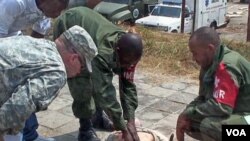The U.S. military's Africa Command, or AFRICOM, has been a critical partner for the State Department, since its inception in 2008, in addressing conflict and transnational issues across Africa. AFRICOM, as part of the U.S. government's strategic engagement, partners with African nations to build their capacity to provide for their own security, counter extremism, and contribute to peacekeeping.
With U.S. military work across the African continent being coordinated by a single dedicated geographic command it is more effective and efficient to successfully build sustainable, indigenous African security capacity that respects civilian authority and human rights, and contributes to economic and social development.
AFRICOM has held joint military exercises with many African countries. In 2009, around 650 military personnel from Burundi, Kenya, Rwanda, Tanzania and host nation Uganda joined U.S. troops for a two-week exercise called Natural Fire 2010. The exercise focused on humanitarian assistance and disaster relief. With funding from and in close cooperation with the State Department, AFRICOM has also trained a battalion in Kisangani in the Democratic Republic of Congo. This unit recently deployed to protect civilians in a region where the Lord's Resistance Army is active.
In the Horn of Africa and North and West Africa, AFRICOM is building the capacity of local militaries so that they can counter extremist threats. In support of the State Department's peacekeeping training program ACOTA, AFRICOM personnel mentor and train Ugandan and Burundian contingents that make up the bulk of AMISON peacekeepers in Somalia. In West Africa, AFRICOM's Special Forces are helping to build the capacity of Malian and Mauritanian forces to counter al-Qaida in the Lands of the Islamic Maghreb.
In Libya, AFRICOM worked closely with State Department and USAID to return thousands of Egyptians stranded in Tunisia to their homes. The air bridge complimented AFRICOM's leadership of a coalition of 10 nations that stopped the advance of the Libyan Army on defenseless civilians in Benghazi, put into place a no-fly zone over Libya, and established a sea embargo against the Gadhafi regime.
By training professional military units that respect the rule of law and civilian control, AFRICOM is helping to create the conditions for security, stability, respect for human rights, and economic development.
AFRICOM - Global Security In Africa

AFRICOM has been a critical partner for the State Department in addressing conflict and transnational issues across Africa.



